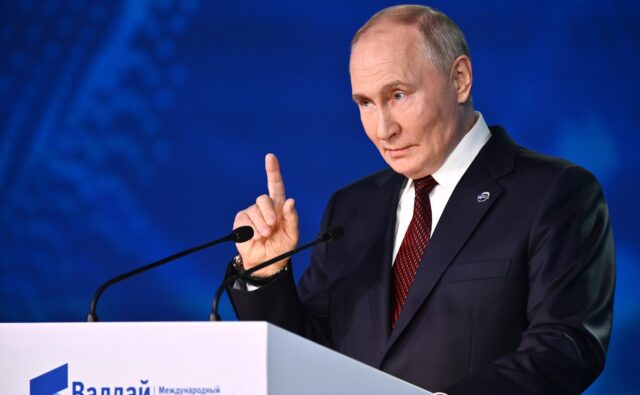
Moscow Prescribes Own Terms For Talks With Trump On Ukraine
Publication: Eurasia Daily Monitor Volume: 21 Issue: 167
By:

Executive Summary:
- President Vladimir Putin and other senior Russian officials have begun familiarizing the incoming US administration of Donald Trump with Moscow’s terms and conditions for a political settlement of the Russia-Ukraine war.
- The Kremlin has noted Trump’s eagerness for a “deal” and expects to turn that sentiment into leverage. Moscow, however, looks set to continue its ground and air offensive operations to strengthen its diplomatic hand before entering talks with Washington.
- Russia portrays its annexation of Ukrainian territories as irreversible and insists that the 2022 “Istanbul” draft documents and Putin’s recent list of demands remain the foundation of any political settlement of the war.
Moscow is in no hurry to hold talks with US President-elect Donald Trump on halting Russia’s war in Ukraine. The Kremlin expects its forces to continue, slowly but steadily, seizing more Ukrainian territory, grinding down the country’s infrastructure and housing stock with air strikes, setting preconditions for a social crisis in Ukraine this coming winter, and depleting the national morale. Trump shows himself eager to substantiate his “deal-maker” reputation by brokering a peace deal between the Russian and Ukrainian presidents even before his own presidential inauguration.
From Moscow’s perspective, however, holding such talks at this time could stymie its military operations in Ukraine before they attained their objectives. It would be entirely out of character with the Kremlin to enter negotiations with a major foreign leader who has not yet taken office. Moscow will, however, be ready to engage with Trump following his January 20 inauguration. By then, Russia also expects its military position to have grown stronger in Ukraine. The Kremlin could then turn Trump’s manifest eagerness for a deal into leverage against the US president.
Awaiting that moment, Moscow is prescribing its own terms for possible talks with Trump on Ukraine. Within two days of Trump’s November 5 election, Russian President Vladimir Putin used a high-profile Valdai Club event to announce his willingness to hold talks with Trump on Ukraine when certain conditions are met. Putin listed those conditions but not before paying his respects to Trump’s “courageous, manly reaction to the assassination attempt against him. The man proved himself, showed his character in that extraordinary situation.” Congratulating Trump on his election, Putin professed to be “more than ready” to hold talks with Trump and “open to restoring relations with the United States,” but he would not initiate a telephone call to the US president. “The ball is in the US court” (Kremlin.ru, November 7).
Follow-up statements by Deputy Foreign Minister Sergei Ryabkov (Interfax, November 9) and Foreign Minister Sergei Lavrov (TASS, November 13; Mid.ru, November 14) elaborated on Putin’s list of conditions for Russia-US high-level talks on ending the war in Ukraine. The conditions are familiar for the most part. They refer to prerequisites, processes, and outcomes, including:
- Talks can only commence once Russia regains the entire territory of its Kursk oblast.
- The United States should initiate talks with Russia.
- No quick fixes. “His [Trump’s] signals about a super-quick settlement are nothing but election campaign rhetoric” (Ryabkov).
- “The subject matter of talks cannot be merely a ceasefire, but a solution that would lead to restoring cooperation between these two peoples that are indisputably fraternal despite these tragic events” (Putin).
- Peace talks must at first involve Russia and Ukraine bilaterally. They must proceed from the “Istanbul documents,” tentatively drafted by Moscow and Kyiv in March-April 2022 and based on Putin’s own June 14, list of demands to Ukraine (see EDM, March 17, 30, 31, April 4, 5, 2022, May 29, 30, June 20).
- Ukrainian President Volodymyr Zelenskyy must rescind his October 2022 decree banning direct political negotiations with the Kremlin (see EDM, October 5, 2022).
- “Russia will certainly consider and answer Trump’s and any US proposals if geared to a political settlement, but not geared to supporting the Kyiv regime and feeding its expectations” (Lavrov).
- “Western countries … should abruptly [rezko] cut the volume of their support to Kyiv, including military support, and get [their] Kyiv clients to abandon the idea that they could achieve anything without a direct dialogue with Moscow. This is what the US-led West must focus on during Trump’s presidential term” (Lavrov).
- “Ukraine’s post-war borders must reflect the sovereign decisions of the people who live on the lands that we name our historic lands” [alluding to the four Russian-annexed provinces on the Ukrainian mainland] (Putin).
- The North Atlantic Treaty Organization (NATO) had opened its door to Ukraine aiming to “appropriate our [Russia’s] historical territories.” Post-war good-neighborly relations between Russia and Ukraine would only be possible if Ukraine is a permanently neutral country.
- “The European Union has practically turned into the same thing as NATO in a military-political sense … NATO and the European Union will arrange some division of labor between them (Lavrov)—a warning that Russia could deem Ukraine’s candidacy to EU membership as incompatible with neutrality.
These terms and parameters are not new, nor is their listing complete. They are presented with fresh emphases to familiarize Trump’s incoming team with them, ahead of possible direct contacts between the Trump administration and the Russian government. These statements concern putative negotiations on a bilateral basis between Moscow and Kyiv but stop short of referring to follow-up negotiations in a multilateral format regarding post-war security guarantees to Ukraine. This multilateral track became the proximate cause for the collapse of the 2022 “Istanbul” negotiations because Russia was included among the would-be security guarantors of a neutral Ukraine. If Russia insists on being included in the multilateral format again, the negotiations are bound to collapse.



